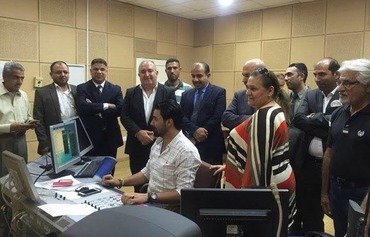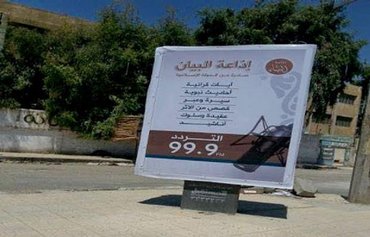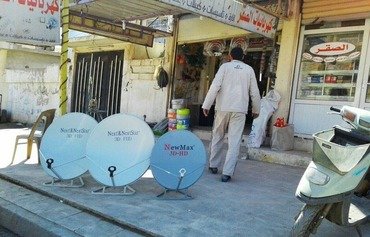In addition to being deprived of education, food and security during the rule of the "Islamic State of Iraq and the Levant" (ISIL) in Mosul, residents also lost their right of access to information, media professionals tell Diyaruna.
Since it took control of Mosul in June 2014, ISIL imposed a media blackout on local residents, banning them from owning satellite dishes and limiting their Internet access.
In the past couple of months since the start of the offensive to retake Mosul from ISIL, the group's fighters have also started confiscating mobile phones and land lines , punishing anyone, often with death, who defies the ban.
In response to this media blackout, Iraqi radio stations have launched their own initiatives to keep both Iraqis still trapped inside Mosul and those who are displaced in camps around Ninawa province informed of the latest developments on the ground.
Platform for trapped residents, IDPs
In collaboration with UN agencies, Sulaimaniya-based Radio Nawa in the Kurdish region has started broadcasting special programmes for internally displaced persons (IDPs) from Mosul that cover issues related to their humanitarian and daily needs.
Mohammed Fateh, editor at Radio Nawa, told Diyaruna that the programmes inform IDPs about how to access services they are most in need of during their displacement.
"They can also follow the latest developments about military operations in their areas," he said.
These radio shows host daily an official from various services departments to answer live on air questions by the IDPs, he said, adding that "several of the problems and needs in refugee camps have indeed been resolved through this media platform".
The project included handing out 2,000 radios to IDPs from Mosul, one device per family, said Waleed Ali, a journalist with Radio Nawa.
IDPs were also given special phone numbers they could dial to call in to Nawa's radio programmes, he told Diyaruna.
This segment of society "is in dire need of someone who listens to their requests and helps make their voice heard by the relevant authorities", he said.
"Not only was the objective to provide a platform for airing and discussing urgent service crises, but it also involved putting together a variety of cultural, educational and medical programmes based on the needs of IDPs," he said.
Making up for lost time
Such media programmes will make it easier for information to reach IDPs in an attempt to fill the information gap that has existed for more than two years since ISIL took over Mosul, UNHCR spokeswoman in Erbil Bathoul Ahmed told Diyaruna.
"ISIL was imposing a media blackout on citizens to the extent that merely owning a mobile phone endangered their lives," she said, adding that residents "had no way of knowing what was happening around them".
Other stations such as Radio al-Ghad, which broadcasts from Erbil, has tried to reach out to people inside Mosul who are still living in ISIL-controlled territory.
Radio al-Ghad has on many occasions aired interviews with people secretly calling from Mosul to share tales about their suffering. One caller said, "I have been trapped here for two years and three months and I know nothing about what is happening in the world around me."
Another caller said that parts of Mosul still under ISIL control suffer from significant shortages in water and electricity , and one female listener spoke about how ISIL fighters started disappearing from the streets of Mosul ahead of the start of the liberation battle.

![Displaced Iraqi women and children from Mosul arrive on December 16th at the Sewdinan camp for internally displaced persons near the village of Hasan Sham, about 35 kilometres from Mosul. [JM Lopez/AFP]](/cnmi_di/images/2016/12/19/6820-iraq-radio-mosul-600_384.jpg)






